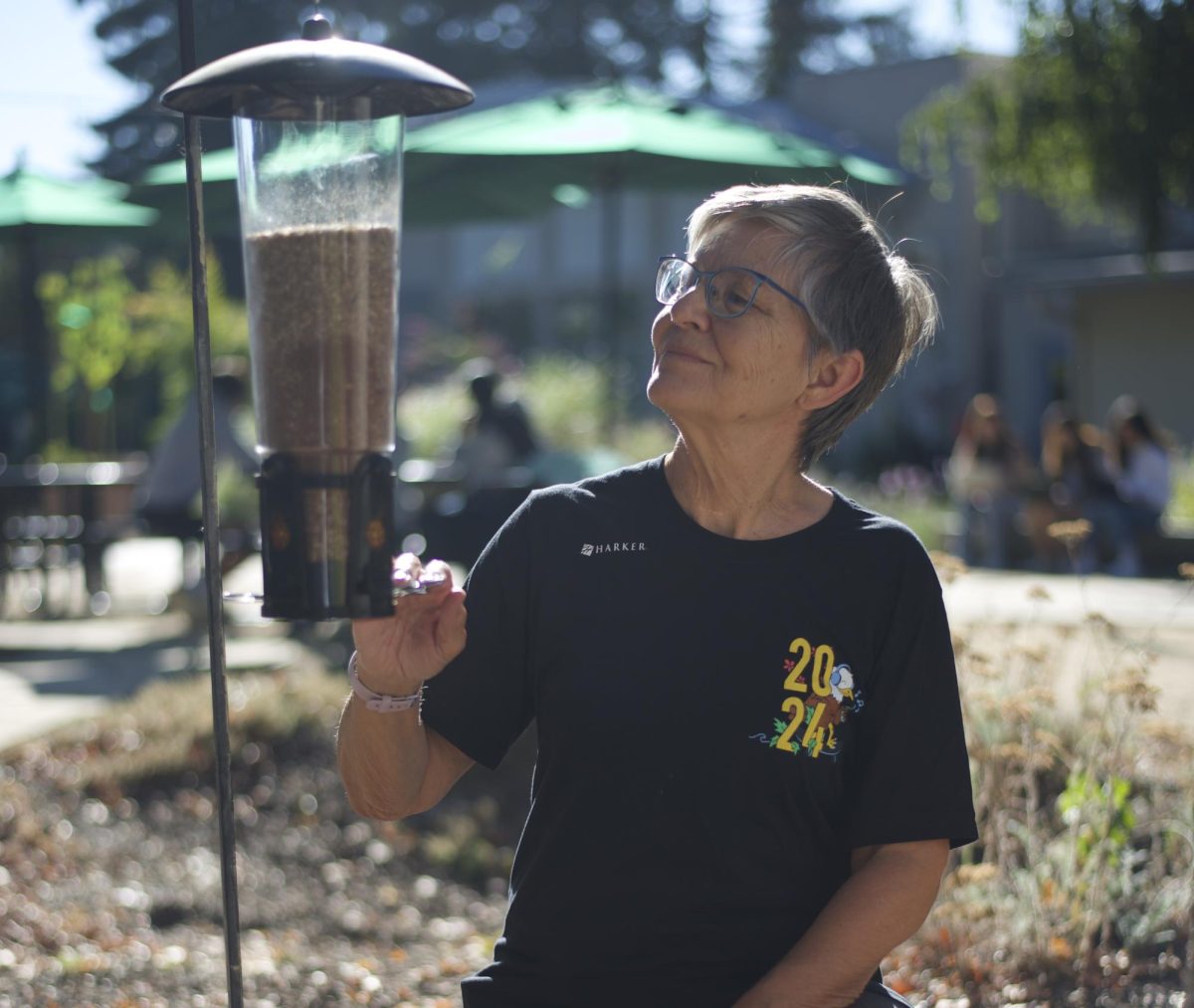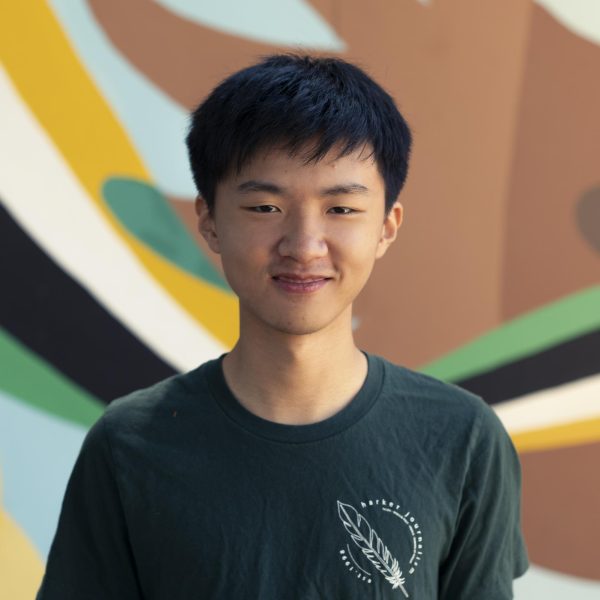As the morning light strikes the lake, a curved, slender bill sweeps through the placid water, searching for any trace of fish. The sun casts its gaze onto the bearer of the bill, a lone avocet, pausing just long enough for the dawn to illuminate its golden-peach plumage. Computer science teacher Susan King watches from afar, taking in the majesty of the occasion.
King took up bird watching at the start of the COVID-19 pandemic in 2020, captivated by the birds’ melodies and feather patterns. Where once the noise of bustling traffic had pervaded the streets singing songbirds replaced the atmosphere of crowded cars during lockdown.
“It’s fascinating to watch how birds either are kind of collectively together or how they spread themselves out,” King said. “Some birds are pretty cranky with each other and some birds just seem to want to be together. It just is fascinating to me to watch and appreciate the differences. And besides, they’re gorgeous. Birds are gorgeous.”
While bird watching, King noticed a great variety in the birds’ flight patterns. Now, after a long time watching, she can distinguish between species just by looking at their flights.
To King, every flap of a bird’s wing and each intricate pattern that decorates their feathers is a miracle of nature. As a young girl in Montana, King fostered a special appreciation for the natural world. The feeling of movement, whether it be through a human body or witnessing it in other creatures, is magical to her.
“I just love fresh air; I love greenery; I love moving,” King said. “I just love being in a human body and feeling it in motion. I know that sounds corny, but it is true. And it’s been true. And I think that my love of moving is to be outside in the greenery.”
Her fascination with the world later manifested into a natural curiosity, leading to questions and queries about all parts of life. The same musings about human nature have translated into wonderings about bird structures, and even computer science.
“Curiosity became one without me being aware of it,” King said. “Curiosity just came to the forefront. I love asking questions. I love listening to people. I love watching. I’m not a scientist, but I like just being curious. It’s just such a blessing that I’ve given myself to be curious.”
King’s curiosity led her to explore new fields, a prominent one being computer programming. Having first encountered the prospect of programming in a newspaper ad during middle school, the vast possibilities and novelty of the space excited King.
“It was an up and coming field – being a computer programmer,” King said. “And you had to be good at math. I was good at math. And so I decided to do it as a sixth grader. I lucked out. I truly lucked out. I love it. I loved it very early on, and I still haven’t fallen out of love with programming still.”
Her love for programming eventually led her into teaching. What King initially anticipated would be a two-year stint in education flourished into a long career of teaching, one of over twenty years, after she discovered her love of teaching even outweighed that of programming in industry.
“At the age that I was at, [I wanted] to give back to the community,” King said. “I loved programming so much that I wanted to share it with high schoolers. My goal was to teach for two years, and instead, I fell in love with teaching even more than I loved programming. So here I am.”
Continually learning and exploring, King strives to find the beauty in all things, whether that be birds, people or computer science. Throughout it all, she attributes curiosity to her continued growth, cultivating a greater appreciation for life.
“Be curious,” King said. “I think my other advice to my younger self is you may not know it now, but life can become this amazingly joyful experience. I’m joyful now. I’m very glad to be alive. I’m very glad to be around people, to be curious about people, to be curious about the world around me. And I think as a younger person, I did not know that was possible.”


















![“[Building nerf blasters] became this outlet of creativity for me that hasn't been matched by anything else. The process [of] making a build complete to your desire is such a painstakingly difficult process, but I've had to learn from [the skills needed from] soldering to proper painting. There's so many different options for everything, if you think about it, it exists. The best part is [that] if it doesn't exist, you can build it yourself," Ishaan Parate said.](https://harkeraquila.com/wp-content/uploads/2022/08/DSC_8149-900x604.jpg)




![“When I came into high school, I was ready to be a follower. But DECA was a game changer for me. It helped me overcome my fear of public speaking, and it's played such a major role in who I've become today. To be able to successfully lead a chapter of 150 students, an officer team and be one of the upperclassmen I once really admired is something I'm [really] proud of,” Anvitha Tummala ('21) said.](https://harkeraquila.com/wp-content/uploads/2021/07/Screen-Shot-2021-07-25-at-9.50.05-AM-900x594.png)







![“I think getting up in the morning and having a sense of purpose [is exciting]. I think without a certain amount of drive, life is kind of obsolete and mundane, and I think having that every single day is what makes each day unique and kind of makes life exciting,” Neymika Jain (12) said.](https://harkeraquila.com/wp-content/uploads/2017/06/Screen-Shot-2017-06-03-at-4.54.16-PM.png)








![“My slogan is ‘slow feet, don’t eat, and I’m hungry.’ You need to run fast to get where you are–you aren't going to get those championships if you aren't fast,” Angel Cervantes (12) said. “I want to do well in school on my tests and in track and win championships for my team. I live by that, [and] I can do that anywhere: in the classroom or on the field.”](https://harkeraquila.com/wp-content/uploads/2018/06/DSC5146-900x601.jpg)
![“[Volleyball has] taught me how to fall correctly, and another thing it taught is that you don’t have to be the best at something to be good at it. If you just hit the ball in a smart way, then it still scores points and you’re good at it. You could be a background player and still make a much bigger impact on the team than you would think,” Anya Gert (’20) said.](https://harkeraquila.com/wp-content/uploads/2020/06/AnnaGert_JinTuan_HoHPhotoEdited-600x900.jpeg)

![“I'm not nearly there yet, but [my confidence has] definitely been getting better since I was pretty shy and timid coming into Harker my freshman year. I know that there's a lot of people that are really confident in what they do, and I really admire them. Everyone's so driven and that has really pushed me to kind of try to find my own place in high school and be more confident,” Alyssa Huang (’20) said.](https://harkeraquila.com/wp-content/uploads/2020/06/AlyssaHuang_EmilyChen_HoHPhoto-900x749.jpeg)




